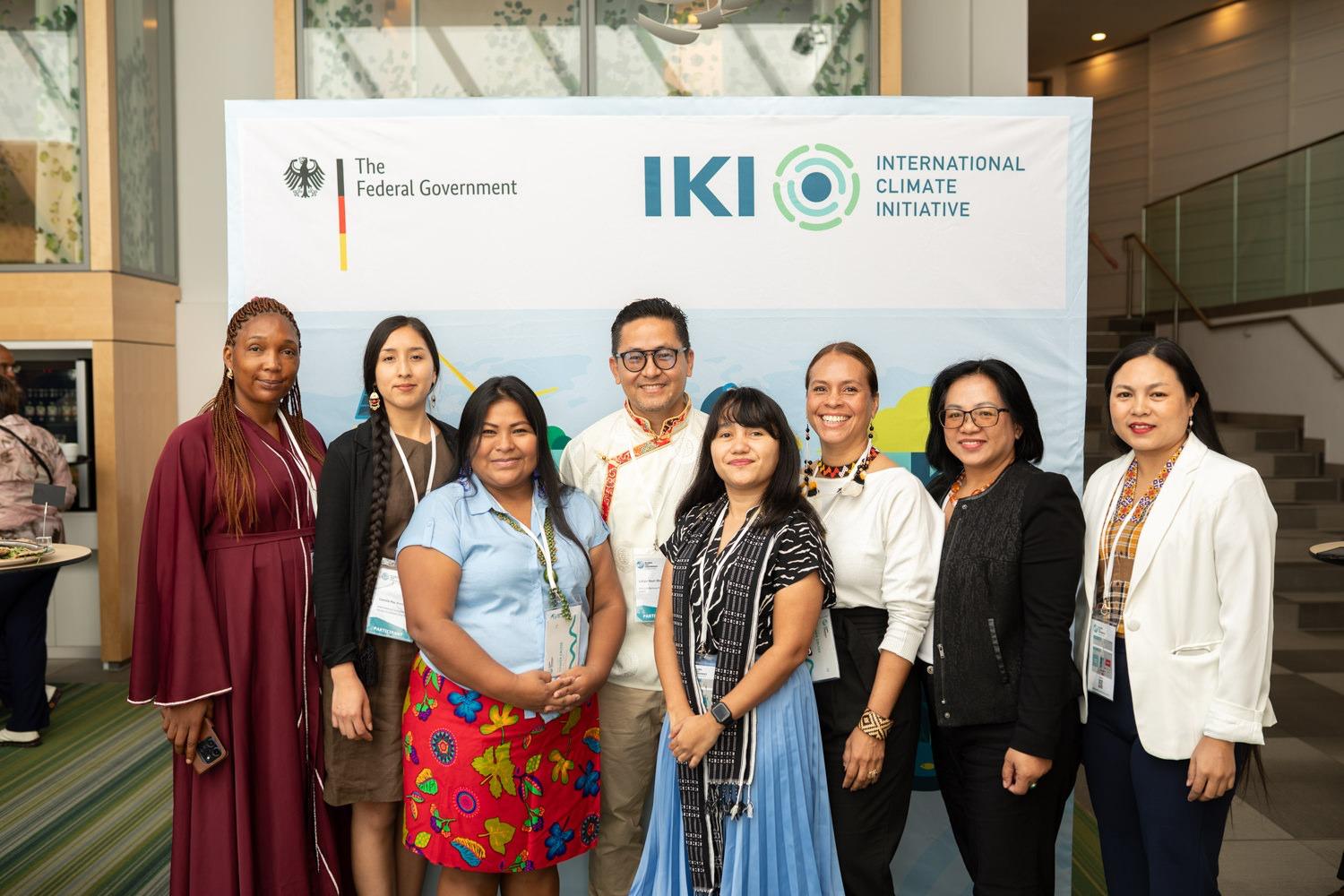
Making their voices heard: Indigenous Peoples at the NDC Global Conference 2025
As government ministers, policy makers, parliamentarians, private sector and the international community gathered for the 4th NDC Global Conference in Berlin, Germany on 11-13 June 2025, 7 Indigenous persons from Asia, Africa and Latin America, including an indigenous youth, participated and made their collective voices heard in this pivotal international platform.
“It was the first time that Indigenous Peoples had a collective participation in the NDC Global Conference, and we are grateful for the opportunity for us to learn and share in the discussions, and network with everyone”, said Mai Thin Yumon, an Indigenous woman from Myanmar.
The NDC Global Conference is a biennial gathering that brings together policy makers, climate experts, practitioners, innovators and other stakeholders who are involved in the development and implementation of Nationally Determined Contributions (NDCs), to share experiences and forge partnerships towards transformational climate action around the world. It is organized by the NDC Partnership, United Nations Development Programme (UNDP) and GIZ (deutsche Gessellschaft für Internationale Zusammenarbeit (GIZ), with the support of the Federal Government of Germany and the International Climate Initiative (IKI).
This year, the Conference focused on exploring ways to set more ambitious climate targets and create clear, actionable plans that translate NDCs into implementation; learn from successful project pipelines and good practices; discuss innovative financing solutions – public of private – that can unlock the resources needed to support transformative climate policies; and connect with climate experts, share ideas and build partnerships.
Indigenous Peoples’ collective voice
Across the three days, Indigenous delegates, despite limited spaces, powerfully shard their perspectives and grounded the discussions in lived realities. They directed attention to the frontline communities who safeguard the planet’s ecosystems yet suffer the most from climate change’s devastating impacts. Balkisou Buba, an Indigenous woman from Cameroon, called for a people-centered, human-rights-based approach to addressing climate change.
Their message was unequivocal: there is no pathway to achieve the goals of the Paris Agreement without the leadership and stewardship of Indigenous Peoples and local communities.
They echoed a strong call: ambition must now translate into a concrete action.
Indigenous Peoples consistently emphasized the following priorities:
- Meaningful participation and engagement in shaping, designing, NDCs, implementing and monitoring NDCs, ensuring the inclusion of women and youth;
- Respecting for the right to self-determination, including the application of Free Prior and Informed Consent (FPIC);
- Recognition and integration of Indigenous knowledge and time-tested solutions into national climate and biodiversity policies;
- Support for Indigenous-led initiatives and actions, through direct financial support, technical assistance and capacity building.
- People-centered approach to climate solutions that is inclusive, rights-based, and grounded in territorial and cultural integrity.
As Camila Romero, an Indigenous youth from Chile expressed, “for Indigenous youth, climate action is not a political choice, it is a necessity for survival, culture and life”.
Lakpa Nuri Sherpa, an Indigenous person from Nepal, reminded governments and private sector of their obligations under international law, to protect and respect Indigenous Peoples rights as laid down in the UN Declaration on the Rights of Indigenous Peoples, ILO Convention 169 and other human rights instruments.
From Berlin to Bonn to Belém: Sustaining Momentum
As most of the Indigenous participants transitioned from the Global NDC Conference in Berlin to the SB62 climate meetings in Bonn (16-26 June 2025), they brought the same priorities that they raised at the NDC Global Conference to the discussions in Bonn. A dialogue on the “Ethical and Equitable Incorporation of Indigenous Values and Knowledge and Local Knowledge Systems” in NDC’s was held on 17 June 2025 where representatives of governments including Brazil, Indonesia and Greenland shared good practices from their respective government’s experiences.
The path from Bonn leads directly to COP30 in Belém, Brazil (10-21 November 2025)—a milestone moment that will take place in the heart of the Amazon. With Indigenous territories representing many of the world’s most critical carbon sinks and biodiversity hotspots, COP30 aims to deliver stronger guarantees for Indigenous Peoples' participation and access to climate finance. Indigenous Peoples are mobilizing to bring 3,000 delegates to what they are calling the “Indigenous COP,” aiming to draw global attention to the urgent need to protect their lands and territories, ensure their full inclusion in decision-making processes, uphold their rights, and secure a renewed tenure pledge for them. In Brazil, Indigenous organizations have launched the campaign “A Resposta Somos Nós” (The Answer is Us) to spotlight the critical leadership of Indigenous Peoples and local communities in delivering climate and nature-based solutions.
Sonia Guajajara, Brazil’s first Minister of Indigenous Peoples, is leading the Peoples’ Circle that ensure wider participation of Indigenous Peoples and Afro-Descendants at COP 30, and have their voices heard at the negotiation tables.
For UNDP and our partners, this is a call to action: to scale what works, listen deeply, and ensure that community-led climate action is central—not peripheral—to global ambition.
From Words to Action: UNDP’s Support for Indigenous and Community-Led Solutions
Recognizing the invaluable role of Indigenous Peoples and local communities in climate and nature action, UNDP is committed to supporting their leadership through a range of dedicated programmes that channel finance directly to their communities. These initiatives are strengthening participation in national policy processes; scaling up community-led solutions that protect ecosystems, uphold rights, and foster sustainable development; strengthening traditional governance; building their capacities; and promoting their traditional knowledge.
Channeling finance directly to communities:
- Between 2022 and 2025, UNDP delivered 51 direct grants to 42 Indigenous, Afro-descendant, and local communities across Ecuador, Colombia, Kenya, and Cambodia under the NDC grants.
- Since 1992, the GEF Small Grants Programme has funded 29,744 community-led projects in 136 countries.
- The Youth4Climate initiative has supported 100 youth-led projects in 52 countries since 2023.
- Since 2002, the Equator Initiative has recognized and supported 306 Indigenous and local communities across 84 countries through the prestigious Equator Prize.
- The ICCA Global Support Initiative (ICCA-GSI) has enabled 655 projects in 45 countries since 2014.
As we look ahead to COP30 in Belém, Brazil, UNDP is scaling up its support for Indigenous Peoples and local communities to ensure their full and effective participation in global climate processes. With COP30 taking place in the Amazon—on Indigenous territory—it is a crucial moment to reaffirm commitments to rights-based, community-driven climate solutions. UNDP will continue to champion Indigenous leadership, expand direct access to finance, and advocate for a stronger tenure pledge that puts Indigenous Peoples and local communities at the center of climate ambition and action.

